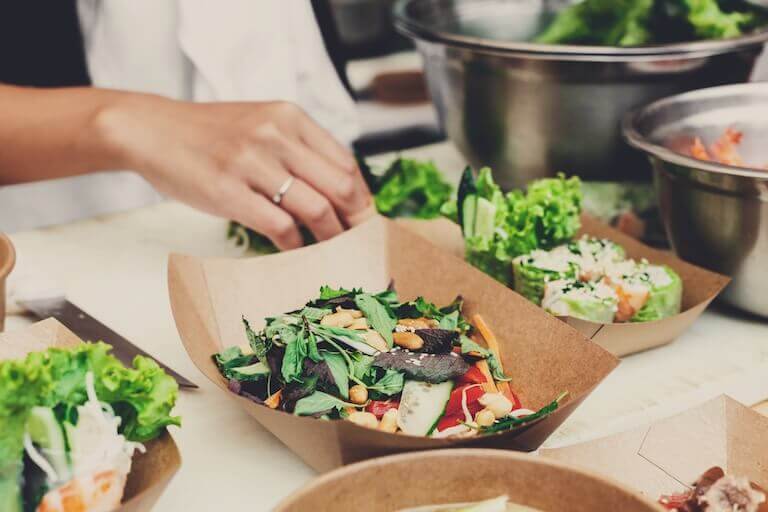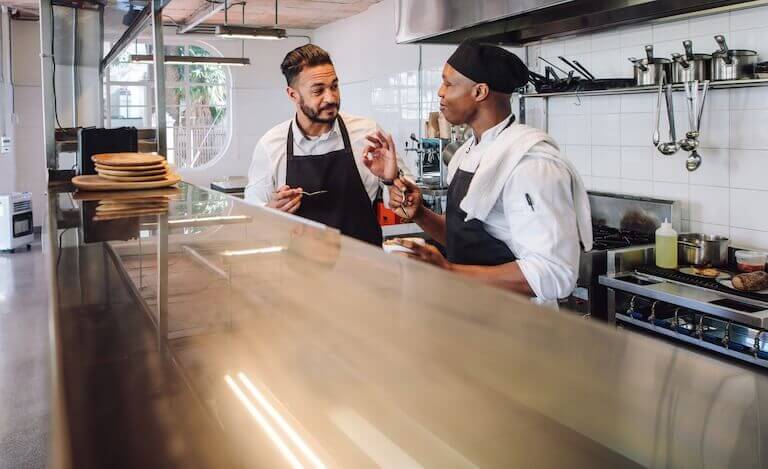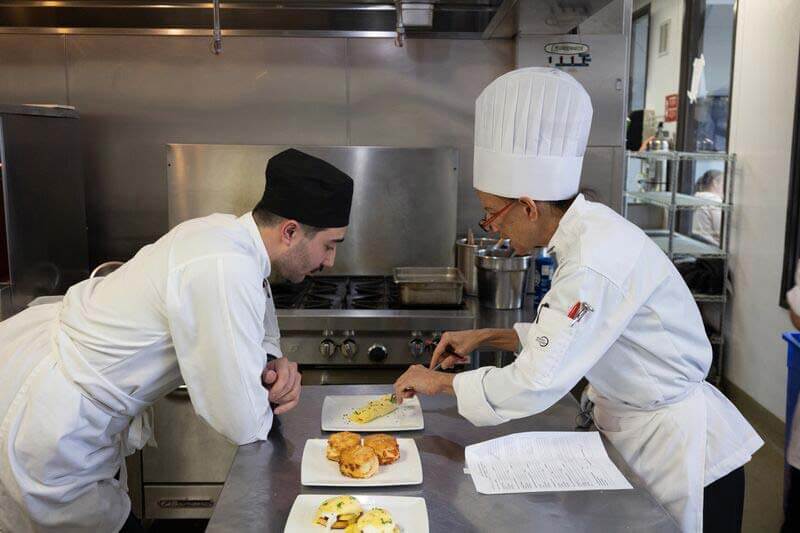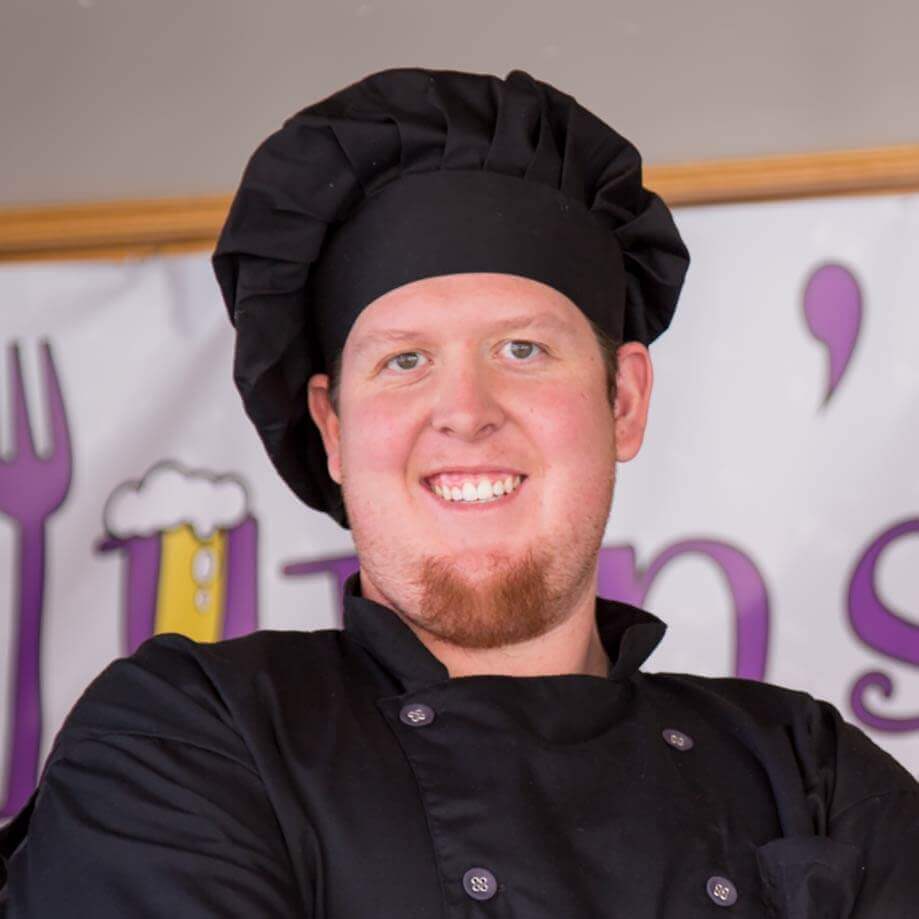Listen to This Article:
Maybe you love to cook, but the idea of starched white tablecloths, tasting menus, or painstakingly placing microgreens with tweezers doesn’t excite you. If you’ve been wondering whether a culinary degree could lead to a kitchen where creativity meets efficiency, where fresh food is served fast, and teamwork drives the energy, fast-casual dining might be exactly where you belong.
While some culinary grads will set their sights on Michelin-starred restaurants or luxury hotels, fast-casual kitchens are looking for trained talent, too. These spots blend quick service with chef-driven quality, and they often want more than cooks. They’re hiring future leaders, creative thinkers, and team players who can help run a high-energy kitchen.
So, where does your culinary training fit into this fast-growing part of the industry? Let’s take a look.
Is Fast-Casual Where You Belong?
Fast-casual kitchens are typically high-tempo and highly team-oriented, and often offer more predictable hours than fine dining. For many culinarians, that combination of energy, collaboration, and work-life balance makes fast-casual an appealing career choice. They’re distinct from quick-service, or fast food restaurants, which focus more on speed, low cost, and standardized offerings.
Fast casual—restaurants that blend the convenience of counter service with fresh ingredients and chef-driven menus—is also one of the fastest-growing segments in the restaurant world, especially since 2023. More than half of American consumers report dining at or ordering from fast-casual restaurants regularly.
What Is a Fast-Casual Restaurant?
A fast-casual restaurant blends the convenience of counter service with fresh ingredients and chef-driven menus. Its emphasis is on quality and speed, combining quick execution and guest experience.
According to Nation’s Restaurant News, fast-casual and quick-service restaurants have posted steady traffic growth every quarter since early 2023, even while traditional full-service dining has hit a plateau. And the growth isn’t slowing down. In fact, the U.S. fast-casual market is expected to expand by $84.5 billion between 2025 and 2029, according to the Technavio 2025 Industry Report.
If you’re looking for a career path where you can sharpen your skills, take on leadership roles, or contribute to creative menu development, fast-casual may offer the right opportunities. Take a look at how fast-casual stacks up against other types of restaurant careers.
Choosing Your Path: How Kitchen Roles Stack Up
Of course, not every kitchen environment is the same. Here’s how fast-casual compares to other common career paths in foodservice:
- Fast Food: Focused on speed, volume, and efficiency. Roles are highly task-specific, with standardized processes and pre-prepped ingredients. A solid entry point for gaining basic kitchen experience and moving into supervisory roles, but with limited opportunity for creativity. Think of chains like McDonald’s, Burger King, Wendy’s, Taco Bell, or regional favorites such as In-N-Out Burger.
- Fast-Casual: A balance of quality and speed. You’ll work quickly, but with a stronger emphasis on fresh ingredients, quality execution, and guest experience. Kitchens tend to be more collaborative, and there’s often room to grow into leadership, management, or R&D roles. Examples include concepts like Sweetgreen, Panera, Bibibop, Chopt, and Chipotle.
- Michelin-Starred or Fine Dining: Precision, high-pressure service, and exacting standards define this world. You’ll likely start in a narrow, specialized role and work your way up. Expect long hours, demanding chefs, and little room for error. This is a great fit for those chasing elite culinary mastery — but it’s not the only way to build a respected career. Some of the top restaurants in the U.S. in this category include Ever in Chicago, led by chef Curtis Duffy; Per Se in NYC; Atelier Crenn in San Francisco; or The French Laundry in Napa Valley.
Inside the Kitchen: How Different Restaurant Roles Compare
| Kitchen Type | Focus | Work Style | Food Standards | Growth Opportunities | Environment |
|---|---|---|---|---|---|
| Fast Food | Speed and Efficiency | Task-specific, highly structured | Pre-prepped, bulk items | Entry-level to manager | Fast-paced, repetitive |
| Fast Casual | Quality and speed | Team-oriented, hands-on | Fresh ingredients, standardized recipes | Leadership, management, R&D | Fast-paced, collaborative |
| Fine Dining/Michelin-starred | Precision and Excellence | Highly specialized roles, strict hierarchy | Highest standards, intricate techniques | Slow promotion, elite networking | High-pressure, demanding |
No matter which path you choose, understanding how these environments compare can help you make the right move for your career.

Fresh ingredients and quality execution are at the heart of the fast-casual experience.
How Culinary Grads Are Making Their Mark in Fast-Casual
Brands like Chipotle, sweetgreen, and Shake Shack have helped redefine what dining out looks like. They’ve shown that high-quality meals don’t always require formal service or fine-dining settings. With fresher ingredients, chef-inspired menus, and a casual, counter-service setup, they’ve carved out a space where good food meets convenience—and consumers are eating it up.

In fast-casual, chefs often collaborate on R&D and flavor testing on new menu items.
Behind many of these brands are chefs with formal training. Steve Ells, the founder of Chipotle, graduated from formal culinary school and credited his education with teaching him the power of preparation and fresh ingredients. At Tender Greens, a California-based chain, a classically trained chef leads the kitchen at every location. Even Shake Shack draws on culinary expertise in its innovation labs to craft new menu items.
For fast-casual restaurants that aim to elevate the dining experience, trained chefs bring technical skills, while also helping to shape menus, guide kitchen operations, and lead teams. It’s a segment where culinary grads can make a meaningful impact.
*Information may not reflect every student’s experience. Results and outcomes may be based on several factors, such as geographical region or previous experience.
The Skills That Set You Apart in Fast-Casual Kitchens
With a culinary education, you can bring skills that can help kitchens run smoother, faster, and more efficiently. Here are just a few things you can bring to the table:
Solid Technique
From setting up your mise en place to breaking down proteins efficiently, culinary grads can bring precision to prep work and consistency to cooking. Whether it’s slicing vegetables for grain bowls, searing proteins for build-your-own plates, or calibrating seasonings across batches, solid technique can help maintain speed and quality during busy service.
*Information may not reflect every student’s experience. Results and outcomes may be based on several factors, such as geographical region or previous experience.
Food Safety Know-How
In a fast-casual kitchen where food moves quickly from prep to plate, safe handling is critical. Culinary grads have experience in how to set up safe workstations, avoid cross-contamination during batch prep, and store hot and cold items according to code, all of which reduce health risks and keep operations running smoothly.
Consistency Under Pressure
Ticket times matter in fast-casual. When lines are out the door, your culinary training can help you stay calm, prioritize tasks, and keep quality high, whether you’re assembling a dozen salads at once or communicating with the expo to avoid bottlenecks. That steadiness under pressure can support the entire team.
Creative Problem-Solving
If a prep item runs low mid-service or a piece of equipment goes down, a trained cook can pivot without compromising quality. You might adjust a recipe on the fly, reassign tasks to keep the line moving, or flag inventory issues before they impact service. In fast-casual kitchens, the ability to adapt in real time keeps operations steady and guests satisfied.
Leadership Potential
Many fast-casual brands love to promote from within. Take Chipotle, for example. In 2022 alone, they promoted more than 22,000 employees, with 90% of management roles filled internally. Your kitchen skills, paired with professionalism and a strong work ethic, can help you move from line cook to shift leader, kitchen manager, or even general manager—roles that often come with higher pay, team leadership, and real career growth.

Fast-casual brands often promote from within, creating pathways to leadership roles.
Your Fast-Casual Career Takeaways
Even when formal training isn’t a hiring requirement, your culinary education may help you stand out, adapt quickly, and qualify sooner for leadership opportunities. It can also give you a foundation in operations, cost control, and recipe development, especially helpful if your long-term goal is to launch your own fast-casual concept.
Whether you’re aiming for a line position, stepping into management, or planning to open your own fast-casual spot, a culinary education can give you a meaningful head start. Fast-casual restaurants continue to evolve, and they need skilled, motivated people to help shape what comes next.


